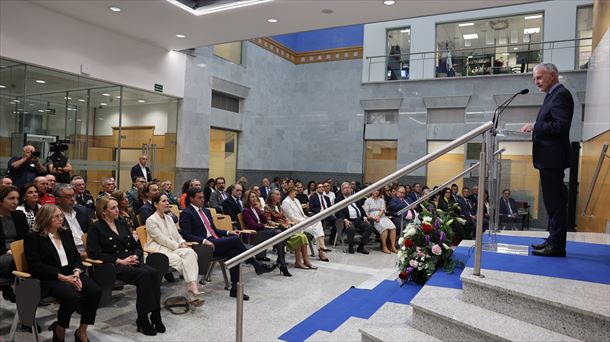Hundreds of members of the Scientific Uprising Team staged a demonstration this Wednesday in front of the House of Representatives during a week of protest against the backdrop of passivity by governments, companies and institutions around the world to combat climate emergencies. A group of young people painted the main façade of Congress red and then sat down on the other side of the Carrera de San Jeronimo, in the Plaza de las Cortes.
Minutes later, dozens of riot police stormed a rally on Friday, removing hundreds of protesters by truck.
The global protests are preceded by the publication of a new report by the United Nations Scientific Panel (IPCC), which warns of the irreversibility of global warming and the consequences it will have on the entire planet if drastic and urgent measures are not taken. “Either now or never.” The conclusions are clear: CO2 emissions must now be drastically reduced because, at current rates, gaseous crusts will make it impossible to limit global warming to 1.5ºC, as countries have promised, and scientists point to this tolerable limit.
The promotions will take place all week. It has already happened in Spain on Mondays and Tuesdays, and this Wednesday it has reached the Congress, where the ordinary control session of the government is being held. Several hundred people are gathered in front of the main gate, which is next to the lions. Later, their group climbed the stairs and threw red paint on the façade as a symbol of the “climate extinction” that condemned humanity if, as experts say, no means were used against global warming.
Later, they staged a protest in Plaza de las Cortes, chanting slogans against the inaction of governments, companies and institutions. At this time, half a dozen vans of the National Police Intervention Unit (UIP) arrived with large demonstrations of sirens and riot gear to lower, raise, and drag the last group of protesters who had peacefully resisted. Before they are invested and before their identification.
Dozens of officers were involved in the police operation. There were more riot police than protesters at the time of identification. There were moments of tension with both the young people protesting and the press trying to document what had happened. Neither one nor the other received shouts and shouts despite the absolute absence of violence beyond police action.
One of the people who took part in the protest is Jorge Richmann, a professor at the Autonomous University of Madrid, who told elDiario.es that beyond the IPPC Sixth Report, humanity is “dragging decades in the wrong direction.” Ahead that ends in uninhabited, hellish land. This doctor of political science was concerned that there were no massive demonstrations like what happened before the pandemic caused by the corovirus, the so-called Friday for the future.
Several deputies joined the rally. First, Alyanza Verde’s spokeswoman and United We Can deputy Juan L ლოpez de Uralde. The former director of Greenpeace Europe sat down with one of the groups of protesters who took advantage and rebuked him for the passivity they also find in the institutions to solve the problem. Among the grievances are the low ambition of the recently approved climate change and energy transition law.
Later, other United We Can representatives such as Sophia Castanioni, Anton Gomez Reynolds or Lucia Munoz Dalda attended. Also More Country’s spokesperson, Íñigo Errejón. The protesters criticized all of them for their unsuccessful work to achieve climate goals and asked them not to become protest spokespersons, though none made a statement to the media beyond the debate and some debates. Of activists, which was captured on camera.
Source: El Diario
I’m an experienced news author and editor based in New York City. I specialize in covering healthcare news stories for Today Times Live, helping to keep readers informed on the latest developments related to the industry. I have a deep understanding of medical topics, including emerging treatments and drugs, the changing laws that regulate healthcare providers, and other matters that affect public health.



